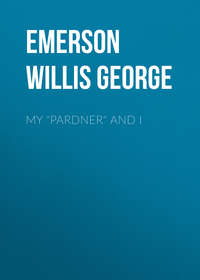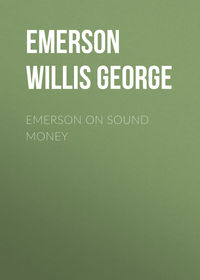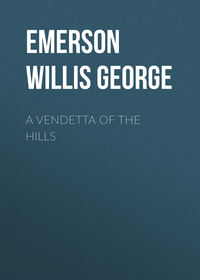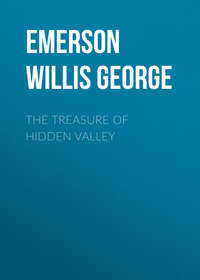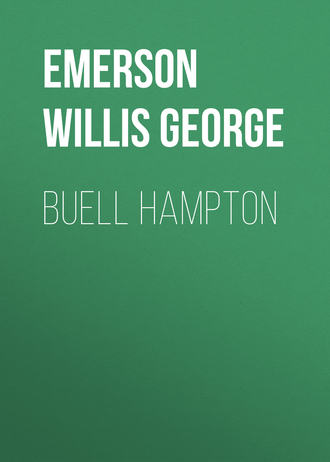 полная версия
полная версияBuell Hampton
“You see, Lucy,” said Mrs. Horton, as she sipped her wine nervously, “this is the third letter Doctor Redfield has written. He seems so persistent.”
“You have it with you?” asked Mrs Osborn, as if she were asserting a fact.
“Yes,” replied Mrs. Horton, as she took the letter from her bag and handed it to Mrs. Osborn, “I want you to put this with the others. Oh, dear! I feel so worked up over this affair; and to think of Lord Avondale’s misfortune! How long do you suppose it will be before he can again travel?”
Mrs. Osborn carefully scrutinized the handwriting on the letter. A diplomatic expression came over her beautiful face. “Yes, it is Doctor Redfield’s writing,” she affirmed, half to herself. “Oh, how long, did you ask, before Lenox dare travel? Perhaps a month; his physician tells me he has had a narrow escape. His broken arm – the result of his hunting trip in the mountains – was the least of his sufferings, poor fellow. A fever set in, he writes me, and for a while he was quite delirious. He will be here as soon as he can safely travel, – within a month, I am quite sure.”
“I shall be so glad when he returns,” sighed Mrs. Horton. “Ethel seems much more reconciled of late.”
“Indeed?” replied Mrs. Osborn.
“Oh, yes,” continued Mrs. Horton. “I was urging the advantage of a marriage with Lord Avondale the other day, and she replied, in a most indifferent manner, ‘Very well, mamma, I have ceased to care one way or the other, if it pleases you, I presume it ought to be acceptable to me.’ She then said something about being tired of life, and broke down in tears. Of course I consoled her as only a mother can.”
“Subdued at last!” cried Mrs. Osborn, triumphantly. “We may now hope to see merry old England again. Away!” she went on, exultingly, “away with American stupidity! We have outwitted her blond-mustached ‘brain-worker.’.rdquo; Mrs. Horton seemed to catch the spirit of her friend’s confidence. “Yes,” she ejaculated, “see England and our many friends; and, oh, to think how proud I am, Lucy, that my daughter is to be Lady Avondale. Why, it is quite enough to make the heart of any mother throb with ecstasy.”
“Indeed it is,” replied the designing Mrs. Osborn, “and you are entitled to so much credit for the clever ways in which you have managed it.”
“No, Lucy, you are deserving of the praise in this affair far more than myself,” replied Mrs. Horton. “Indeed, I could not have gotten on at all without you.”
“I certainly have done my utmost to serve you,” said Mrs. Osborn, in a sycophantic tone. “I feel sure you will always be grateful – and Ethel, too, won’t she?”
“Indeed, we shall,” replied Mrs. Horton, unhesitatingly.
“And I shall always be a welcome guest at Ethel’s English home?” Mrs. Osborn went on.
“Always!” replied Mrs. Horton. “Of course you will. Why ask such a question?”
“Oh, I know I shall be, I assure you,” she replied, demurely, “but then I wanted to hear you say so, don’t you know? Now there is only one serious phase in our program – Doctor Redfield.” She still held his letter addressed to Ethel.
“What would you advise, Lucy? You are so clever, and know so much better than I what is best to be done.”
“My dear Mrs. Horton, will you be guided by what I say, entirely?” She was standing near an elegantly carved escritoire as she spoke.
“Entirely, Lucy, I will do as you say,” replied Mrs. Horton. Quick as a flash Mrs. Osborn caught up an ivory paper-knife and tore away the envelope.
“Oh, Lucy!” cried Mrs. Horton, excitedly. “Don’t! don’t – I feel so guilty.”
“My dear, there is no turning back,” replied the cool and calculating Mrs. Osborn. “A title for Ethel is at stake. We must burn every bridge behind us.” Then, glancing at the letter, she read aloud:
“My own dear Ethel: – I lift up my voice for the third time, and call to you. Will you not answer? I am as one in a wilderness of doubt and sorrow. My heart tells me that you have not forgotten your promise – a promise that has stimulated me with sweetest hope all these weary months of waiting. One word, Ethel, – only one word; even if it is to say that you have forgotten me. With my heart’s tenderest love, I am all your own,
“Affectionately,“Jack.”“His devotion is quite amusing,” laughed Mrs. Osborn, as she seated herself before her escritoire and began writing. Presently, turning to Mrs. Horton, she said: “Here is your reply:”
“Dr. Jack Redfield,
“Sir: – My daughter has referred your several rather amusing and absurd letters to me for reply, and desires me to say that your communications annoy her very much. As she is already betrothed to Lord Avondale, and will be married in a short time, you certainly cannot, if you possess any gentlemanly breeding, wish to intrude further upon her your unreciprocated attentions.
“Respectfully.”“Oh, Lucy,” cried Mrs. Horton, half-hysterically, “I cannot sign such a letter; I cannot indeed. Let it go unanswered.”
“Just as you say,” she replied, while a tigerish look of hatred and disdain arose to her usually pretty face. “Perhaps,” she went on, in a low purring voice that required an effort to modulate, “it will be as well to dismiss all thought of Doctor Redfield. I am quite sure we shall never hear of him again.”
Soon after, Mrs. Horton took her leave and, as she drove slowly homeward, she was glad that she had not signed that awful letter. She sighed a little, as if a weight rested on her conscience. “I am truly glad,” she said to herself, “that Lord Avondale will soon be with us.”
Mrs. Osborn was provoked at her friend’s lack of courage in grappling with and crushing all possible danger. After the departure of Mrs. Horton, she read Jack Redfield’s letter again. Then she read the reply which she had prepared for Mrs. Horton to sign. “This letter ought to be sent,” she observed, “or I am no general.” Dipping her pen in the ink, she addressed an envelope to Dr. Jack Redfield, then – turning to the letter – she paused a moment. Her courage failed her, and she laid down the pen. Unlocking a small drawer of her escritoire, she took out a bundle of letters, and, selecting the topmost one, commenced reading. As she read one after another, a passionate light animated her beautiful face and eyes. “Lenox, dear Lenox!” she murmured. “Yes, I will do it.”
Taking up the pen, she hastily signed the name of Mrs. J. Bruce-Horton to the letter, then carefully enclosing it in the envelope, she went quickly out and posted it.
Thus, at the expense of conscience, she made an instalment payment on a title for Ethel Horton.
CHAPTER XXIV. – REVERSING THE HIGHER COURTS
THE evening after the mailing of that fatal letter to Dr. Jack Redfield, some one rapped on Hugh Stanton’s door.
“Come in,” said Hugh, as he went on with his toilet. The door opened, and Judge Lynn walked in. The judge’s facial appearance gave evidence that he had just come from a barber shop. He frequently passed one hand over his smooth-shaven chin, as if to call attention to it.
“Hello, Mr. Stanton,” said he, as he helped himself to a chair. “You’re dressin’ up like you might be goin’ somewhere.”
“I have been invited to dine with the Osborns.”
“Jist so; danged good place to get a square meal; bet yer life it is.”
“The Osborns are very hospitable people,” observed Hugh, as he went on with his toilet.
“Look ‘e here, Stanton,” said Judge Lynn, “did you think I was drunk the other evenin’ when you and Major Hampton and myself were discussin’ the Barley Hullers?”
“I don’t know,” replied Hugh, evasively, “were you?”
“No, sir,” said the judge, emphatically, “don’t you believe it; not for your life. I jist got to thinkin’ about a case I’d decided in my court that day. A complex, tryin’ question of law, sir, always exhausts me, as it did the other night, and I fell asleep.” Hugh turned his face away to conceal his amusement.
“What’s the matter with you, anyhow, Stanton; you’re gettin’ mighty disbelievin’ it ‘pears to me; what are you grinnin’ ‘bout? Can’t a feller go to sleep if he feels like it?” asked the judge.
“How is business in your court, Judge?” asked Hugh, paying no attention to his irritation.
“Oh, she’s poppin’ these days, and don’t you forget it,” replied the judge. “You see, we’ve had no rain since last fall, and here it’s the first of May. Dry weather nachally makes our people irritable and brittle. Fellers ‘round here can’t pay their interest, and the Eastern capitalists are gettin’ down on ‘em. Mortgages are bein’ foreclosed, right and left; bet yer life, law business with me is hummin’.”
“We certainly need rain,” said Hugh. “The farmers, however, tell me that the barley, wheat, corn, and other crops are looking fairly well, notwithstanding the dry weather.”
“That’s a fact,” replied the judge, “crops are lookin’ devilish good, considerin’. Fact is, there’s lots of water in the ground from last year’s rains, but she’s oozin’ out danged fast lately, and within a week or two more, unless we have rain, things’ll be dryer ‘n powder dust. Yes, sir, loan companies are already gettin’ skittish, and sendin’ back applications for farm loans, unfilled.”
“Oh, come,” said Hugh, “you are a pessimist. We shall have a good rain before many days, and then you will change your mind.”
“Don’t you believe it, sir,” remarked the judge, with emphasis. “Now let me tell you, – but gosh almighty, what’s the use of talkin’ to you, Stanton; I can’t convince you, though I am right. It’s only a waste of words. You ‘re lariated with the balance of ‘em, and held in the iron grip of error. You go on believin’ jist as you please, anyway. Say, I called for a little favor. I want to borrow five dollars.”
“Want to borrow five dollars?” repeated Hugh.
“Yes, sirree, I do,” answered the judge, “and see here, Stanton, you must n’t refuse me. You see I had a case in my court the other day, and sort of attempted to interfere with a decision of the Supreme Court of the Sunflower State. It has resulted in the attorney-general’s gettin’ gay and frisky like, and sendin’ me the most contemptible and impudent telegram I ever read. I want the five dollars to telegraph back my defense. Fact is, I have jist got to have it; bet yer life I have. Oh, I can mighty near tell by the way my neck itches that somebody is makin’ a halter for it, bet yer life.”
“Why don’t you send it collect?” asked Hugh.
“Why, dangnation, man, I tried it, and the fool of an operator down here someway don’t have the right idee about the importance, dignity, and responsibility of my court, and he would n’t send it unless the shekels were put up in advance.”
Hugh handed the judge five dollars, and asked him if he did not think he had exceeded his authority in interfering with a decision of the Supreme Court.
“Law, my dear Stanton,” replied the judge, blandly, as he put the five dollars in his pocket, “law is my hobby. Speakin’ unreserved-like, they can’t down me on the statutes, no, sir; and if I had that low-down varmin of an attorney-general here, why, I’d fine him for contempt of court; bet yer life I would. Oh, I know a whole lot when it comes to law. Well, I must be goin’.”
“Good day,” said Hugh, as the judge started toward the door; “call again.”
“Good day,” responded Judge Lynn. “I’ll hand you back this special accommodation tomorrow.”
A little later Hugh hurried along the street toward Captain Osborn’s, laughing softly to himself at the oddities of Judge Lynn. When he reached the Osborn home, to his surprise he found Miss Marie Hampton there.
“I intended to surprise you,” said Mrs. Osborn, coquettishly, “by having Major Hampton and Marie with us, but have succeeded only partially. The major is away from home, but I carried Marie away with me this afternoon, and have persuaded her to remain with us for dinner.”
“I am truly delighted with your thoughtfulness,” replied Hugh, bowing deferentially to Marie, “but, really, Mrs. Osborn, you have no need of adding to the attractions of your lovely home to induce me to come.”
“I am not so sure of that,” replied Mrs. Osborn, as her musical laugh rang out merrily, “the captain and I are beginning to believe that you are incorrigible in your habit of neglecting your friends.”
“Hugh is a most excellent man of business,” replied the captain, “but he throws social obligations to the winds, unless his frequent visits to the Hortons prove an exception.”
“Don’t jest about impossibilities, Captain,” said Mrs. Osborn. “Lord Avondale will soon return, and – well, we all know what that means.”
Hugh’s face reddened at Mrs. Osborn’s words. He was not at all sure about the correctness of her inference.
“My calls at Major Hampton’s are quite as frequent as at Mr. Horton’s,” replied Hugh.
“You could come oftener and still be welcome,” observed Marie, while her heart beat fast with admiration for Hugh, an admiration she could not entirely conceal.
“Oh, thank you,” said Hugh, “that is a compliment I shall not soon forget,” and, as he spoke, caution beat a hasty tattoo on the drumhead of conscience.
Hugh could not help noticing that Marie was growing more and more beautiful. She was attired in an evening dress of black lace, which was admirably becoming to her graceful figure. Her heavy tresses shone like burnished gold and the softer shades of copper, while the rose hue of perfect health tinted her cheeks. The animated way in which she conversed with Hugh confirmed Mrs. Osborn’s suspicions that she was in love with him, while he was too stupid, she told herself, even to suspect it.
The dinner-hour passed pleasantly, Mrs. Osborn giving the captain but few of her tiger-claw scratches. The veteran invariably took refuge in the snug harbor of little Harry, whenever a serious break seemed imminent, and thus warded off all collisions with the war-cruiser of his domestic life. As they arose from the table, Hugh turned to Mrs. Osborn and asked her rather abruptly when Lord Avondale was expected.
“Why, what is that to you?” replied the wily
Mrs. Osborn, as she looked rather exultingly at him.
“I am interested in knowing,” replied Hugh.
“Well, but your interest is only platonic, you know.”
“Perhaps,” answered Hugh.
“Oh, perhaps,” repeated Mrs. Osborn, as she elevated her eyebrows and smiled bewitchingly at him. Hugh, however, made no reply, and Mrs. Osborn’s nerves received a shock by his silence as well as by the turn affairs were taking. She mentally resolved to wire Lord Avondale, on the next day, to hasten his coming.
Returning to the drawing-room, Captain Osborn pushed aside the heavy hangings that separated it from Mrs. Osborn’s music-room.
“Lucy, my dear,” said he, “I am sure Miss Marie and Mr. Stanton would enjoy some music.”
“By all means,” said Marie, “I have often wished to hear you play, Mrs. Osborn.”
“Captain, what shall I play?” asked his wife, seating herself languidly at the piano.
“Oh, anything,” replied the jovial old captain, “anything from ‘Old Dan Tucker’ to the ‘Fisher’s Hornpipe.’.rdquo;
“You will observe,” said Mrs. Osborn, looking back at Hugh over her shoulder, and smiling, “that my husband is quite primitive in his musical tastes.”
Then followed several selections. She played mechanically, however, and with little expression. There was no soul to rebound from the strings of the instrument. In the very middle of a classical piece, which was beyond her, she suddenly stopped playing, and, turning to Hugh, said:
“Excuse me, but did you not, on one occasion, speak of Miss Hampton’s playing?”
“I doubtless have mentioned it,” replied Hugh.
“Ah, you naughty girl!” exclaimed Mrs. Osborn, laughing, “why did you not tell me? Come, Marie, you must help me entertain these American financiers – these men of affairs. I promise you,” she went on, patronizingly, “that they will not know whether you play excellently or otherwise.”
CHAPTER XXV. – ALMOST A TRAGEDY
I CAN’. speak for Captain Osborn,” said Marie, as she seated herself before the piano, “but I fear, Mrs. Osborn, that you misjudge Mr. Stanton.”
“Oh, thank you,” said Hugh, bowing at the compliment.
“Papa insists,” Marie went on, as she looked at Hugh with her laughing eyes, “that you are wonderfully appreciative, and, doubtless, critical.”
“Indeed,” interposed Mrs. Osborn, with some surprise, “well, had I known that, I would have been more careful in the selections I played.” Marie turned to the instrument, softly fingering the keys and striking a chord here and there until finally she drifted into Chopin’s Fifth Nocturne. Her interpretation was that of a born artist. The music fairly rippled from her deft fingers, as she glided on and on from one beautiful cadence to another, until at last – note by note – as if sobbing a farewell, the melody died away. Then striking a few chords sharply, she took up a lively refrain, which gradually materialized into Rubinstein’s Melody in F. There was a wild abandon and rare power in her playing that appealed to Hugh Stanton’s soul like the wild sweep and rush of sighing winds in a primeval forest.
Again the music melted away to a single note, which quivered like an echo that would not cease its reverberations. Then, gathering the notes in her masterful hands, she played Beethoven’s exquisite Moonlight Sonata. As the rich tones came in answer to her wonderfully magic touch, Marie seemed oblivious of time or of place, and conscious only of the music which swayed and lifted her. She astonished Hugh, Mrs. Osborn, and the captain as well, in her wonderful interpretation of the grand old master. Presently she glided skilfully into the first movement, sustaining and making each melodious note sing out like a thing of life; then, with a genius bordering on the infinite, she masterfully executed the allegretto movement with vivaciousness, and the agitato movement with a hurried, standing effect, and concluded the adagio with an indolent, romance melody of whispers. There was something almost divine in the rich harmonies that filled the room with rapturous ecstasy, while the languorous air trembled with renascent song.
Hugh Stanton had arisen and gradually approached the player as the music went on. When it ceased, he seemed suddenly to awaken. Mrs. Osborn was noticeably moved by Marie’s renditions, and yet her admiration was for the execution rather than for the music itself. She observed Hugh’s agitation, and mentally resolved that Marie Hampton’s music should prove the solution of keeping Hugh Stanton from declaring himself to Ethel Horton. To Hugh she spoke, in a low voice, of Marie’s wonderful gift and of her lovable character. Hugh, however, answered only in monosyllables, for he had been strangely moved.
Mrs. Osborn interpreted his silence differently; and rejoiced at her clever planning in bringing them together in her own home, that she might read what was written.
Hugh escorted Marie to her home that evening. As they walked along he was conscious of a wonderful power in the girl, which he could not understand. In the uncertain darkness her beautiful face was forgotten, and he thought of her only as a materialized genius, whose musical skill had enthralled him. Naturally reserved in the presence of women, he felt more awkward than ever when they were alone, and he was not sure that he answered intelligently Marie’s questions and vivacious girlish talk.
At the door, their hands touched for a moment, as Hugh bade her good night. He could not quite understand his feelings, but he concluded that it was only the remembrance of the music that thrilled him.
Looking back, as he walked along the street, he saw the dim outline of a man following him. So deeply absorbed was Hugh in his own thoughts that he did not hear the footsteps gradually gaining on him. When he reached a darker portion of the street, and not far from the hotel, his pursuer tapped him lightly on the shoulder and said:
“Look ‘e here, Stanton; I propose bein’ plenty p’lite, but I think we’d better hev a talk. I’m not assoomin’ to be much on chin music, but what I say goes.” Hugh turned and found himself face to face with Bill Kinneman, the cowboy. Kinneman was noticeably under the influence of liquor.
“What do you want?” asked Hugh, rather brusquely.
“I want you to browse on a different part of the range an’ quit hangin’ ‘round Major Hampton’s; thet’s what I want, an’ you’ll do as I say, or by the Eternal I’ll give you a dose uv this,” and quicker than a flash he pushed a revolver into Hugh’s face.
The streets were deserted and they were quite alone. Hugh realized his imminent danger. Kinneman held a cocked revolver in his face, and it would be folly to do other than try to effect a compromise. Presently he said: “Kinneman, I thought you had some sense.”
“Waal, hain’t I?” asked the cowboy, still holding his revolver in close proximity to Hugh’s face.
“You are certainly not a good judge of human nature,” replied Hugh.
“Waal, now look ‘e here, my wayfarin’ frien’, I’m no corn-field sailor, an’ I want you to know it,” said Kinneman. “The old major’s daughter possesses sooperier rectitood, and is not fur you. She don’t step in yer class, but she does step in mine, see? An’ you’re flounderin’ in the quicksands uv error if you think different.”
“Oh,” said Hugh, “I am beginning to understand what you mean. You are in love with Miss Hampton, and you fancy that I am also.”
“Thet’s ‘bout what I’d say if I wuz unbosomin’ myself,” replied Kinneman, as he pressed a little closer to Hugh.
“Your fears are groundless,” replied Hugh, emphatically. Kinneman dropped his revolver to his side and exclaimed, “Pardner, is thet squar’.”
“My dear sir,” replied Hugh, “I do not know what love is. I have made no untruthful statement, if that is what you mean by asking, ‘Is that square?’.rdquo;
“Thet’s all I wanted to hear you say,” said Kinneman; “but somethin’ mighty thrillin’ is liable to happen if you reach fur yer artill’ry, so jist keep yer hands away from yer belt.” With this, he turned on his heel. He walked a few steps and then stopped.
“Look ‘e here, Stanton,” said he, “speakin’ wide-open like, there’s only one special thing on earth thet I’ve set my heart on, an’ if I find thet you’ve lied to me, I’m ‘lowin’ I’ll push you off the face uv the earth, an’ fill you so full uv holes that St. Peter won’t know you. I’ll take my chances on the major bein’ favorable, an’ thet girl’s goin’ to be mine if I hev to kill a baker’s dozen to git her.” With this he walked away in the darkness.
Hugh hastened to the hotel. Whether from the exaltation occasioned by Marie’s playing, or from the counteracting influence of Bill Kinne-man’s wicked threat, or from both, he knew not, but nevertheless he felt strangely disturbed, as if a soul chord had suddenly been unkeyed in his life’s harp.
He sat by the window far into the night, endeavoring to choose a course to pursue. Lord Avondale would soon return. A sense of duty forced itself upon him when he thought of Ethel Horton, and he determined to declare himself to her without further delay. He tried in vain to analyze his feelings toward the beautiful and accomplished Marie. A mist rose up before him and he seemed to hear once more the Moonlight Sonata. Then he felt that his interest in Marie was embodied solely in the one word, music. He longed for a confiding hour with his old boyhood friend, Jack Redfield. “If he were only here,” he mused, “I would talk it all over with him and be guided by his advice.” Seating himself at his table, he determined to write to him. Then he fell to musing again, and left the letter unwritten.
CHAPTER XXVI. – REACHING A DECISION
TWO weeks had passed since the Osborn dinner. One morning the captain observed to Hugh, “My boy, have you been idling your time away, or can’t you decide?”
“I don’t quite catch your meaning,” said Hugh, pleasantly.
“Well, to be more explicit,” replied Captain Osborn, “you haven’t yet asked Ethel Horton to become your wife, have you?”
Hugh’s face reddened, and he answered, slowly,’ “No, I have not.”
“Perhaps you have changed your mind,” the captain went on. “Mrs. Osborn says you are desperately in love with Miss Hampton, but I don’t rely on second-hand evidence, and that is why I ask you pointblank. Of course, follow your heart, my boy, wherever it leads you, and you’ll not make any great mistake, provided your affection is reciprocated. Reason cannot be depended on in such matters, for usually it spreads its wings and flies away when we become thoroughly inoculated with the illusion of love.”


